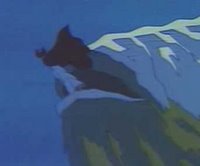Jonah: A Veggie Tales Movie
 Through the Bible in Five and a Half Years has got as far as Jonah now, so I thought it was time for a long overdue review of 2002's Jonah: A Veggie Tales Movie. Incidentally, I'm still deciding whether or not to use a clip from this film, but I think I will probably show a different short film version which I'm linking to here so I can find it easily in future.
Through the Bible in Five and a Half Years has got as far as Jonah now, so I thought it was time for a long overdue review of 2002's Jonah: A Veggie Tales Movie. Incidentally, I'm still deciding whether or not to use a clip from this film, but I think I will probably show a different short film version which I'm linking to here so I can find it easily in future.===
For some reason Jonah has always been a popular children's story (despite being about a man-eating fish), and as a result there have been various cartoon versions over the years including an entry in the Testament: The Bible in Animation series.Yet, it's one that's been largely avoided by filmmakers. In the early days the technical challenges of the pivotal scene were far beyond the film's likely profitability. More recently, however, I suspect it's been the length of the story that has put off potential adapters. At just 4 short chapters there's not a huge amount to go on (although the majority of Hollywood blockbusters could have their plots scribed on the back of a postage stamp, so that's hardly critical).
Jonah circumnavigates this problem by telling Jonah's tale as a story within a story. The biblical tale is framed by a modern day story of a group en route to a gig, who get lost when their car breaks down. They stumble into a restaurant and meet three pirates who observing the animosity amongst the group, decide to tell them the story as a means to getting them to resolve their differences.
The story is presented as an account of events that actually happened to the pirates, but chronologically this wouldn't work at all, particularly when you consider that these pirates are not humans but harvested vegetables. So the link to the material is slightly detached: there's something vaguely reminiscent of The Wizard of Oz here in the way that the people in the framing device are inextricably linked to those in the story, but also somewhat detached.
All of which forms a rather interesting interpretative context in which to place the book of Jonah. Many scholars consider the book to be a kind of parable rather than an account of actual historical events, and so presenting the tale of Jonah as a story within a story fits this dynamic. Furthermore, since the book of Kings briefly mentions the prophet Jonah, there is that kind of link between him and the parable's anti-hero.
One of the things the film gets right is its portrayal of Jonah as an absurd figure. True to the biblical text Jonah is grumpy and proud, and his cartoonish characterisation fits the spirit of the original's portrayal rather well. It also includes the often overlooked final chapter of the book, and grasps that this is this, rather than the fishier elements of the story, that forms the book's interpretative key.
The film does tweak some of the other details however: Nineveh's primary sin is slapping each other with fish, which rather leaves the story run stranded in shallow waters; Jonah manages to get the king's attention when he is arrested because of his pirate friends; and his message grabs the attention of the fish-venerating Ninevites sole-ly because he happens to refer to his time inside the big fish. I'm curious to know whether that final point reflects an older tradition in any way, or some kind of historical knowledge. If so I've not yet encountered it in commentaries I've read.
 The biggest set piece in the story is obviously Jonah getting swallowed by the big fish. The book devotes a whole chapter to Jonah's prayer, which, from a dramatic point of view, works in the same way as a musical's biggest song and dance number. What's more the whole incident is shrouded in supernatural events (not only the fish but the storm, Jonah being highlighted by the casting of lots and the subsequent calming of the storm when his is ejected overboard).
The biggest set piece in the story is obviously Jonah getting swallowed by the big fish. The book devotes a whole chapter to Jonah's prayer, which, from a dramatic point of view, works in the same way as a musical's biggest song and dance number. What's more the whole incident is shrouded in supernatural events (not only the fish but the storm, Jonah being highlighted by the casting of lots and the subsequent calming of the storm when his is ejected overboard).The film, also gives plenty of attention to this incident, saving its most ambitious CGI for what is it's longest scene (the modern day equivalent of a miracle?). And once Jonah has been swallowed up, his prayer is indeed replaced with the film's biggest song and dance number - a black gospel number performed by a choir of singing vegetable angels. All of which is possible because Jonah has been swallowed by a whale rather than a big fish. I suspect that the Hebrew mind would have classified whales along with fish rather than with mammals, so this distinction is rather minor. What is interesting is that in the film's closing number - a summary of the story and its message - Jonah's story is illustrated using a fish. So the film backs both theories, deftly representing the ancient classifications.
The one character I've not yet discussed is Jonah's eternally optimistic sidekick, Khalil, a half worm, half caterpillar business
What this highlights is the direct absence of God in the film. God speaks directly four times in the book, at the start, after the fish has spat Jonah out, when the Ninevites repent, and when the plant dies. Here we never hear him speak, though we witness Jonah hearing God when he prays at the beginning of the story, the middle too occurrences are skipped over, and at the end it is Khalil that speaks for God. This secularises the text somewhat. God is held at a distance so that even the miraculous elements of the story could be down to coincidence. It's not a major problem, but it is yet another example of VeggieTales sanitising the text.
Visually the film is rather poor. It always feels like an extended episode of a TV show rather than anything cinematic and the colour scheme often clashes. There are bright blue backgrounds, but dull yellow foregrounds, shiny green vegetables, but a lot of dirty yellow and grimy clothes. The whale sports a particularly repulsive olive green and yellow look and even Jonah looks off colour for much of the film.
The songs are fairly good though, echoing various musicals from down the ages, and the soundtrack includes a nice nod to Jaws as the whale closes in on the barely floating prophet. And so what I'm left with is "Jonah was a prophet" going round and round in my head. I'm told that the Germans call this an 'ear worm', which in the context a film which uses a worm not only to act for, but also to speak for God is certainly an intriguing metaphor.
Labels: Animation, Jonah, Veggie-Tales



















